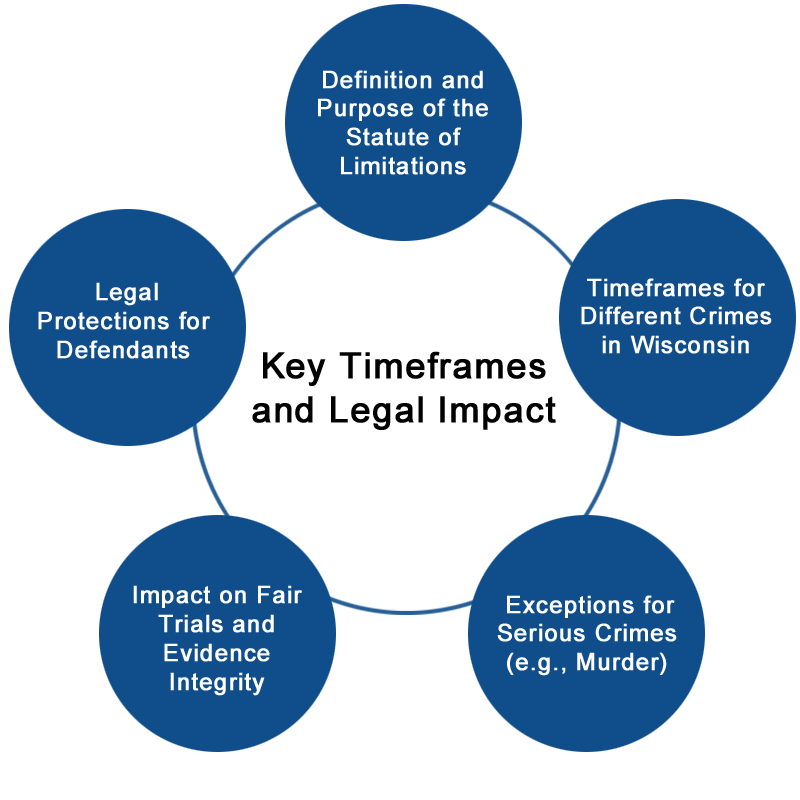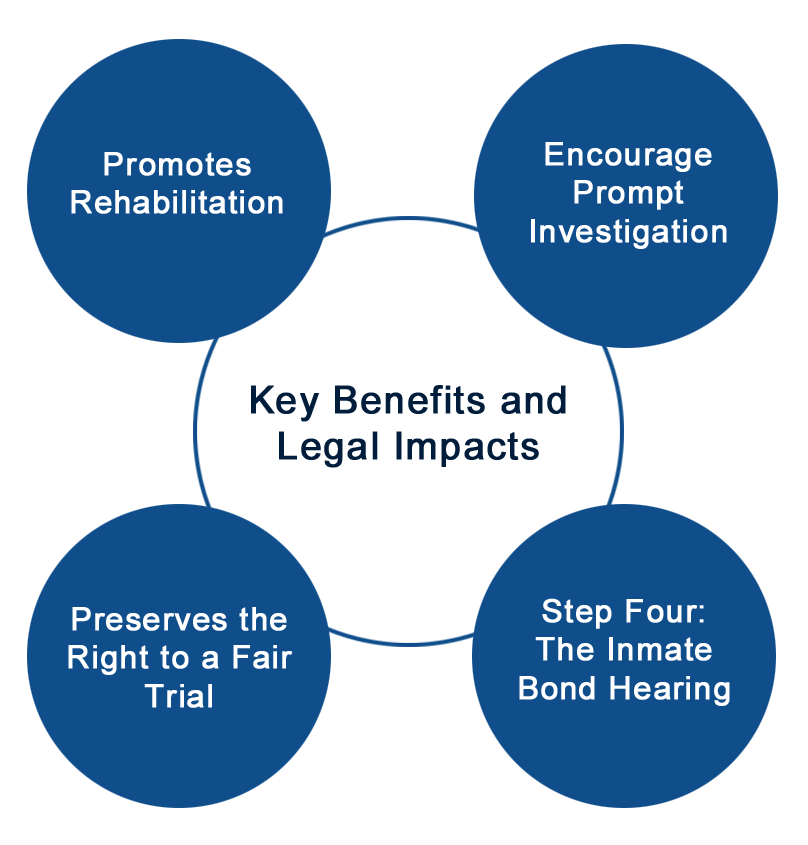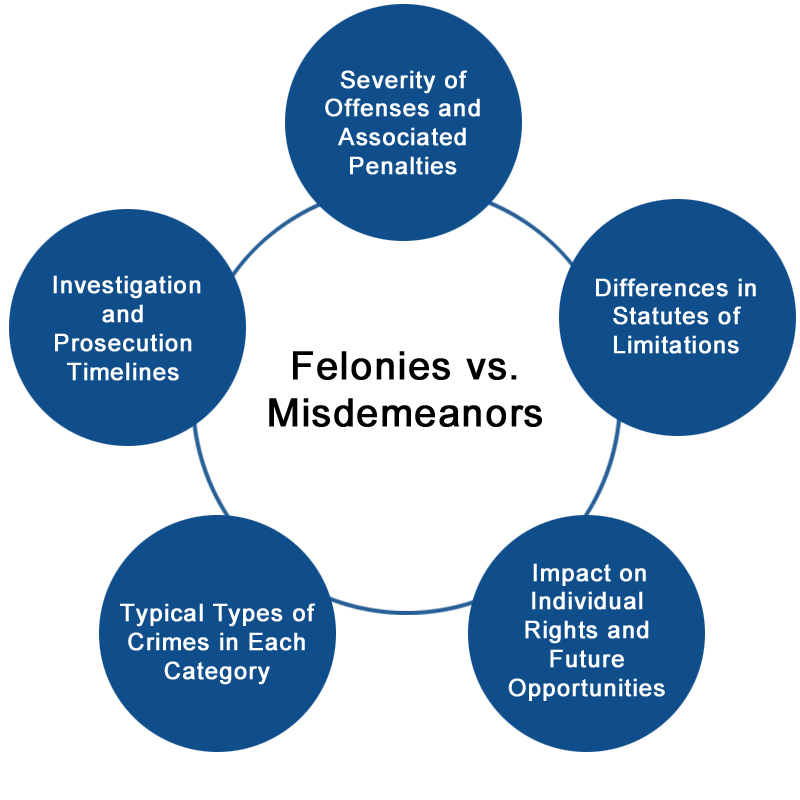Criminal Statute of Limitations in Wisconsin
Criminal Statute of Limitations in Wisconsin Explained
As written in Wisconsin state law, the term “statute of limitations” refers to the amount of time in which prosecutors can legally charge someone with a crime after it has been committed. Essentially, it’s a limited window of opportunity for prosecution that creates fairness in the legal system by providing an “expiration date” after which a person cannot be charged.
This length of time varies from crime to crime in Wisconsin law. For example, those who commit a misdemeanor may only be prosecuted within the first few years. Those who commit murder, or other similarly serious crimes, can be prosecuted at any time as these crimes do not have a set statute of limitations.
Why Does the Statute of Limitations Exist?
By creating a time limit for pursuing prosecution, Wisconsin law protects an individual’s right to a fair trial and upholds the integrity of the criminal justice system. As more time passes, it can be harder to ensure justice is being served, as eyewitnesses’ memories can fade and evidence can be lost. The Statute of Limitations ensures that any judgement is fairly rendered based on solid evidence, and that both prosecution and defense are building their case on credible and accurate information.
But this is not the only way that the Statute of Limitations serves as a vital safeguard around individual rights. It also works to:
Prevent Uncertainty: If there were no statute of limitations in place, an individual who has been suspected of a minor offense would have that hanging over their head indefinitely. Knowing that the police could come knocking at any time, they would be forced to live in a state of perpetual anxiety.
Encourage Prompt Investigation: The Statute of Limitation puts the onus on law enforcement and prosecutors to conduct a thorough and, most importantly, efficient investigation. By forcing them to move quickly, the statute helps prevent wrongful convictions that could come from unreliable testimony and missing evidence.
Preserves the Right to a Fair Trial: Building a credible defense against criminal accusations means establishing an alibi or locating witnesses who can speak to a defendant’s innocence. Reducing delays allows them to present this evidence and testimony while it’s still fresh, allowing for a more thorough and robust defense.
Promotes Rehabilitation: Particularly in cases where a person has committed a minor offense, the Statute of Limitations encourages them to walk the straight and narrow, obeying the law and rehabilitating themselves. Essentially, it’s a legal acknowledgement that people can change and seek self-improvement.
Felonies vs. Misdemeanors: Differences in the Statute of Limitations
As stated earlier, more serious crimes have a longer Statute of Limitations than other crimes – and in some cases, don’t have one at all, meaning they can be prosecuted at any time. The general distinction between more serious and less serious crimes falls into whether they are a misdemeanor or a felony. Under Wisconsin law, felonies are punishable by a year in prison, either at a federal or state facility. Along with greater fines and penalties, a felony conviction can have long-term consequences including losing the right to vote, hold office or own a firearm. Misdemeanors, on the other hand, are more minor offenses like disorderly conduct or petty theft and carry lighter fines, penalties and consequences.
There are three types of misdemeanors under Wisconsin law.
Class A Misdemeanors: This covers a range of crimes including simple assault, non-felony domestic abuse, second-offense marijuana possession, low-value property damage, resisting an officer, bail jumping or reckless driving causing injury. These crimes typically carry a nine-month jail sentence and fines up to $10,000. In addition, second- or third-offense DUIs are considered misdemeanors. A second offense can lead to fines up to $1,100, a license suspension of up to 18 months and up to six months in prison. A third offense can lead to fines up to $2,000, a license suspension of up to three years, and up to a year in prison.
Class B Misdemeanors: Class B Misdemeanors cover an array of crimes including public intoxication, trespassing, non-felony prostitution, illegal possession of prescription drugs, obstructing emergency or rescue personnel, or possession of drug paraphernalia. These crimes typically result in fines up to $1,000 and up to 90 days in jail.
Class C Misdemeanors: The least serious type of misdemeanor, Class C misdemeanors include possession of alcohol by a minor, violation of curfew, littering, loitering, failing to yield to an emergency vehicle, or smoking in prohibited areas. Typically, these crimes will carry penalties of up to $500 in fines and 30 days in jail.
While these lists are by no means a comprehensive picture of what each class entails, they give you the general breakdown of how these crimes are classified. An attorney will be able to provide further guidance based on the crime in question. But regardless of the class of misdemeanor, crimes that carry this classification have a three-year Statute of Limitations under Wisconsin law.
Felonies are similarly classified by letter under Wisconsin law. The most serious of these, Class A Misdemeanors, are punishable by a life sentence and carry no Statute of Limitations. As such, crimes including first-degree intentional homicide, first-degree murder, first-degree sexual assault, felony murder and treason can all be prosecuted at any time after they are committed.
The remaining felony classifications all carry a six-year Statute of Limitations. These include:
Class B Felonies: Including second-degree intentional homicide, second-degree sexual assault, armed robbery with a dangerous weapon, armed burglary or kidnapping, these carry a maximum 60-year prison sentence.
Class C Felonies: Including first-degree sexual assault, manufacturing or delivering cocaine or narcotics, theft of property exceeding $100,000 or aggravated battery, these carry a maximum of 40 years in prison and fines up to $100,000.
Class D Felonies: Including fourth or greater offense of OWI, child enticement, battery by a prisoner and robbery, these carry a maximum of 25 years in prison and fines up to $100,000.
Class E Felonies: Including theft of property or services between $10,000 and $100,000 in value, identity theft, possession of child pornography or forgery or government-issued documents, these carry a prison sentence up to 15 years and fines up to $50,000.
Class F Felonies: Including stalking that causes bodily harm, arson of property other than a building, second-degree reckless endangerment or embezzlement, these carry a prison term of up to 12 ½ years and fines up to $25,000.
Class G Felonies: Including high-value criminal damage to property, harassment involving threats or harm, non-violent burglary or theft of property valued between $5,000-$10,000, these carry a prison term of up to 10 years and fines up to $25,000.
Class H Felonies: Including theft of property valued between $2,500-$5,000, repeated sexual assault of the same child, failure to pay child support for more than 120 days or false imprisonment, these carry a prison term up to six years and fines up to $10,000.
Class I Felonies: Including narcotics possession, theft of property valued less than $2,500, possession of burglary tools or unauthorized use of personal identifying information, these carry a prison term up to three-and-a-half years and fines up to $10,000.
To sum up: For the most part, misdemeanors carry a three-year Statute of Limitations and felonies carry a six-year Statute of Limitations apart from Class A Felonies, which have none. In certain situations, the Statute of Limitations can be extended, for example if DNA evidence emerges linking the accused to the crime or if the accused lives outside the state of Wisconsin. The Statute of Limitations can also be tolled under Wisconsin law, meaning that the time limit is essentially paused, if the accused flees the state or of the victim has been coerced to not come forward.
There are also certain crimes that carry specific Statutes of Limitations that differ from their category. For example, reckless homicide has no statute of limitations when charged in the first degree, but carries a 15-year Statute of Limitations when charged as a second-degree crime.
Schedule A No-Obligation Case Evaluation
If you are under investigation or have been accused of a crime, speak with our attorneys as soon as possible to determine the exact statute of limitations and help protect your rights. In addition to their insight, they can provide you with guidance on how to avoid potential consequences and work on your behalf in defense of your Constitutional rights. Their early involvement gives them a chance to work proactively with prosecution or law enforcement to prevent charges from being filed and to address issues before they become a problem.
It begins with a confidential, no-obligation evaluation of your case. This preliminary meeting lets you confidentially share the circumstances of your case, giving you a better understanding of the options before you and helping you gain control. With a strategy in place and a team of experienced attorneys at your side, you can sleep soundly knowing your rights are being protected.
Call (608) 490-5779 or Schedule a Free Case Evaluation Online




